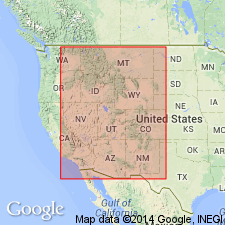
- Usage in publication:
-
- Indian Ranch Tongue*
- Modifications:
-
- Named
- Dominant lithology:
-
- Limestone
- Siltstone
- AAPG geologic province:
-
- Great Basin province
Summary:
Named as an upper tongue of Guilmette Formation. Type section (measured, fig. 11) designated on north side of Indian Creek, 1.5 km west of Indian Ranch, for which unit is named, located on east side of Cherry Creek Range in NE/4 sec. 19, T26N, R64E, White Pine Co, NV, Great Basin province. Name replaces a similar informal name used by Poole and others (1988, USGS Bull. 1725-E) who mapped its total distribution in the Goshute Creek quad. Consists of medium-gray, micritic nodular limestone and yellowish-gray, calcareous nodular siltstone; 151 m thick. Is a time and lithogenetic equivalent of West Range Limestone; West Range not used because nearest occurrences are 170 km to south and southeast and only Guilmette has been mapped and used in intervening area. At type unconformably underlies Joana Limestone; overlies "lower tongue" of lower member of Pilot Shale. Within upper part of Upper TRIANGULARIS through Upper CREPIDA conodont zones. Late Devonian (Famennian) age.
Source: GNU records (USGS DDS-6; Denver GNULEX).
For more information, please contact Nancy Stamm, Geologic Names Committee Secretary.
Asterisk (*) indicates published by U.S. Geological Survey authors.
"No current usage" (†) implies that a name has been abandoned or has fallen into disuse. Former usage and, if known, replacement name given in parentheses ( ).
Slash (/) indicates name conflicts with nomenclatural guidelines (CSN, 1933; ACSN, 1961, 1970; NACSN, 1983, 2005, 2021). May be explained within brackets ([ ]).

